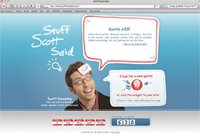 Yes, you have to decide to be successful.
Yes, you have to decide to be successful.
Yes, you have to believe that you deserve to be successful.
Yes, you have to expect that success will come to you eventually.
But that’s not enough.
If you truly want to increase the probability of success, you’ve got to put yourself in the way of success.
Kind of like Zacchaeus, the tax collector. You may remember this story from The Gospel of Luke.
NOTE: If your faith or spiritual practice doesn’t include The Bible, no worries. It’s still a cool story anyway. You don’t have to agree with it to learn from it…
Anyway, Zacchaeus was a guy who held a despised occupation. He had grown quite wealthy extorting money from the public. Naturally, he was not liked by his fellow man.
So, when Jesus came to Jericho, Zacchaeus just HAD to see what this famous man was like. He’d heard the rumors, but wanted to experience Jesus for himself.
So, he not only dropped what he was doing, but went to great lengths to respond to his inner prompting…
Because something pulled him. And he knew he had to take action.
He knew he had to put himself in the way of success.
The problem was, Zacchaeus was not only short on character, but also short in stature. Literally. The guy was like, five feet tall. And naturally, when he arrived at Jericho, he had a hard time seeing Jesus over the hoards of admirers.
So, as the gospel goes, Zacchaeus tried to run in front of the crowd, but to no avail. Ultimately, he decided to climb a sycamore tree to get a better view.
Then, to the surprise of the tax collector – and to the surprise of the entire city – Jesus paused the parade, looked up in the tree and said, “Zacchaeus, make haste and come down, for today I must stay at your house.”
Nobody could believe it. Not even Zacchaeus.
Sure enough, he climbed back down the tree. The crowd watched Jesus embrace the tax collector. And the two friends made their way to Zacchaeus’ home for dinner.
And that’s when the Zacchaeus’ life was changed forever.
Because he put himself in the way of finding what he sought.
And the best part is, in so doing, Zacchaeus found more and better than what he sought.
MY QUESTION IS: What are YOU seeking? What’s YOUR game plan for putting yourself in the way of success?
Today we’re going to explore four strategies to help you do so:
1. Find your pool of prospects and start swimming there regularly. Think about the type of people connected to your goal. Then, ask yourself four questions:
(a) Where do they hang out?
(b) Who do they serve?
(c) Who serves them?
(d) And where do they grow?
For example, if “self-employed, tech-savvy businesspeople” are your bread and butter customers, get out of your basement and start going to Starbucks. At the same time, every day. If that’s where your people hang out, it needs to be YOUR hangout too. That’s how you put yourself in the way of success.
2. Get richer friends. Stop hanging out with people who don’t move you forward. Stop associating with people who haven’t learned how to value you yet. And stop spending time with people who diffuse your focus and hamper your goals.
You need to “walk with wise,” to use another scriptural reference. To surround yourself with cool, smart, connected people that will make achieving your goals natural. So, ask yourself two questions:
(a) What three people would help you take the first steps toward this goal?
(b) Who are the keepers of the current wisdom in the area of your goal?
Identify those people. Buy them lunch. Kiss their asses. Ask lots of questions. Take lots of notes. Keep them updated on your progress. And be sure to thank them endlessly. That’s how you put yourself in the way of success.
3. Practice Strategic Serendipity. It’s not luck. It’s not chance. It’s not accidental. Strategic Serendipity means approaching your daily life with an attitude of expectation AND an action plan of visibility. So, wherever you go, evaluate your surroundings. Be prudent about geography. Position yourself in noticeable locations.
For example, if you’re attending an event, conference or trade show, ask yourself the three questions:
(a) Where will I be the most visible?
(b) What landmark does everybody HAVE to walk by?
(c) And where are people most likely to engage with me?
That an approachability mindset. That’s increasing the probability of an encounter. That’s how you put yourself in the way of success.
4. Remember that behavior is the broadcaster of attitude. Ultimately, this process of “putting yourself in the way of success” depends on what you see when you see people. It depends on whether or not you treat every experience as offering (some) kind of value.
Here’s a four-point philosophy to keep in mind:
Everything is a performance.
Everybody is watching.
Every conversation matters.
Everybody is somebody’s somebody.
Stick with that. That’s how you put yourself in the way of success.
REMEMBER: The door must be opened from the inside.
If you want people to notice you, you’ve got to become impossible to ignore.
If you want to advance in the direction of your dreams, you’ve got to act upon those dreams SO much, that eventually they will have no choice but to become a reality.
And if you want the world to say YES to you, you’ve got to sing the song that is natural for you to sing, in the way that is natural for you to sing it, and it in front of the fans that most need to hear it.
Ultimately, if you want to encounter success, you’ve got to put yourself IN THE WAY of success.
That’s what sticking yourself out there is all about.
And you don’t even have to be a tax collector to do it.
LET ME ASK YA THIS…
How are you putting yourself in the way of success?
LET ME SUGGEST THIS…
For the list called, “13 Sweeping Generalizations, Gross Assumptions $ Ridiculous Oversimplifications about Life and Work,” send an email to me, and you win the list for free!
* * * *
Scott Ginsberg
That Guy with the Nametag
Author, Speaker, Coach, Entrepreneur
[email protected]
@nametagscott
 Never the same speech twice.
Never the same speech twice.
Always about approachability.
Watch The Nametag Guy in action here!


 Download a free copy of The Nametag Guy’s (unofficial) 9th book!
Download a free copy of The Nametag Guy’s (unofficial) 9th book!
 Download a free copy of The Nametag Guy’s (unofficial) 9th book!
Download a free copy of The Nametag Guy’s (unofficial) 9th book!
 Download a free copy of The Nametag Guy’s (unofficial) 9th book!
Download a free copy of The Nametag Guy’s (unofficial) 9th book!
 Download a free copy of The Nametag Guy’s (unofficial) 9th book!
Download a free copy of The Nametag Guy’s (unofficial) 9th book!
 Download a free copy of The Nametag Guy’s (unofficial) 9th book!
Download a free copy of The Nametag Guy’s (unofficial) 9th book! You can’t make the world notice you.
You can’t make the world notice you. Download a free copy of The Nametag Guy’s (unofficial) 9th book!
Download a free copy of The Nametag Guy’s (unofficial) 9th book! “I’ve heard of you before!”
“I’ve heard of you before!” Download a free copy of The Nametag Guy’s (unofficial) 9th book!
Download a free copy of The Nametag Guy’s (unofficial) 9th book! Your name speaks before you do.
Your name speaks before you do.  This book took exactly one year to write.
This book took exactly one year to write. Who’s quoting YOU?
Who’s quoting YOU?